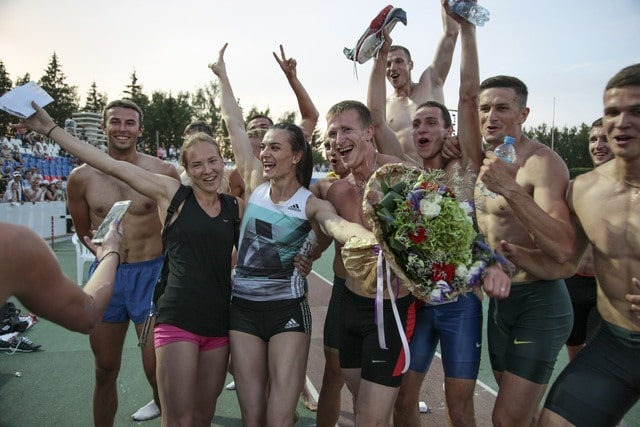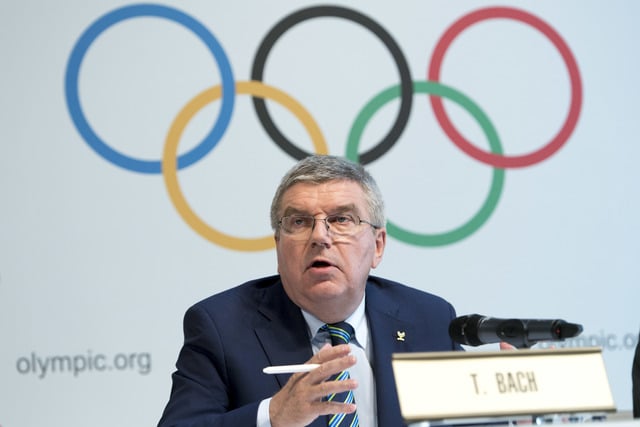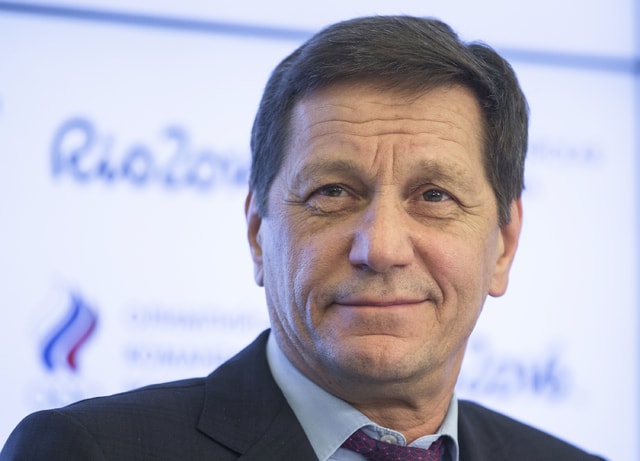


LAUSANNE, Switzerland (AP) — An Olympic summit that many hoped would bring clarity on the ban on Russia’s track and field athletes and other pressing doping issues raised more questions than answers.
Rather than settle the situation, the meeting sowed more doubt, confusion and uncertainty, with less than 50 days before the Olympics in Rio de Janeiro.
The communique adopted by 20 sports leaders at Tuesday’s meeting and comments by IOC President Thomas Bach at a news conference produced few clear-cut conclusions or definitive decisions, leaving many messy questions and issues still at play over the next few weeks.
Yes, the summit said it respected the IAAF’s decision to maintain its ban on Russia’s track and field team for the games. But cracks in the united front appeared immediately when Bach said any athletes who get special IAAF dispensation to compete will do so under the Russian flag, not a neutral flag as the IAAF insists.
Some questions and answers about the summit:
___
Q: What was the main outcome?
A: Hard to say. On one hand, the leaders adopted a unanimous statement saying they support the IAAF decision to bar Russian athletes for systematic doping. But the IOC executive board had already done that on Saturday, so that came as no surprise. Still, the resolution does reaffirm that the bulk of Russian track athletes — including two-time pole vault champion Yelena Isinbayeva — remain out for the games. The Russians are appealing to the Court of Arbitration for Sport (CAS) in Lausanne, however, to let their “clean” athletes in, so the door is not definitively shut.
The summit also declared that the “presumption of innocence” of athletes from Russia and Kenya has been “put seriously into question” by a lack of credible testing and “related substantial allegations.” As a result, it said, all 28 Olympic federations — not just the IAAF — should screen individual athletes in those countries across all sports to make sure they are clean before Rio. But there was a lack of specifics about how and when this could be carried out with so little time left before the games.
___
Q: What about the Russian flag?
A: Last week, the IAAF changed its rules to allow a limited number of individual Russian athletes who have lived outside the country and been subjected to regular, reliable drug-testing — a handful or so — to apply for special dispensation to compete as neutral athletes — not under the Russian flag.
Not so fast, said the IOC. Bach stressed the IAAF had no power to decide on the terms of participation at the Olympics. He said any Russians put forward by the IAAF would be part of the Russian Olympic Committee team and, therefore, compete under the national flag. The IAAF fired back that the IOC had agreed to the plan and the federation would work to make sure it is applied.
It’s difficult to see Bach backing down on that now.
___
Q: Hasn’t the IOC allowed athletes to compete under the Olympic flag before?
A: Yes. Athletes from the former Netherlands Antilles and marathon runner Guor Marial of South Sudan competed as independents at the 2012 London Olympics. Athletes from East Timor marched under the Olympic flag at the 2000 Sydney Games. Athletes from Yugoslavia participated as individuals at the 1992 Barcelona Games.
In Rio, the first ever team of refugee athletes — 10 competitors from South Sudan, Syria, Congo and Ethiopia — will compete under the Olympic banner. And Kuwaiti athletes are also likely to compete as independents because their national Olympic committee has been suspended for government interference.
___
Q: What’s different with the Russians?
A: This is new territory. In the other cases, the athletes had no country or came from countries without U.N. recognition or established Olympic committees. Bach stressed that the Russian Olympic Committee — as opposed to the national track and field federation — has not been suspended, so athletes remain under its control. This is also the first time a country’s entire track team has been banned because of widespread doping.
___
Q: Will Russian whistleblower Yulia Stepanova be allowed to compete?
A: Still unclear. The IAAF says Stepanova — an 800-meter runner who served a two-year doping ban — should be allowed to compete as an independent athlete in recognition of her leading role in exposing Russian cheating. She now lives at an undisclosed location in the U.S. and wouldn’t compete for Russia, obviously. She is expected to run as a neutral athlete at next month’s European Championships in the Netherlands. However, it’s hard to see her competing in the Olympics at this point. IOC officials are unlikely to let a former doper march under the Olympic flag.
___
Q: What’s the process for Russia’s appeals?
A: Russian Olympic Committee chief Alexander Zhukov said athletes will appeal the IAAF decision to CAS, the highest court in the sports world, whose rulings are considered binding. Zhukov said the Russian committee would also challenge the IAAF ruling. The IOC is not the target of the appeals, which aim to allow Russian athletes with no doping record to compete in the games. The IAAF contends there is no way to prove athletes are clean because the entire Russian testing system was tainted. CAS has not announced it has received any appeals yet. Once it does, it will have to act quickly to settle the cases in time for the games.
___
Q: What’s CAS likely to decide?
A: Hard to predict. But CAS has not always sided with the big sports organizations. In 2011, CAS overturned the IOC’s so-called Osaka Rule, which would have barred any athlete receiving a doping ban of more than six months from competing in the subsequent Olympics. The court ruled the sanction represented a second penalty for the same offense.
___
Q: What else could happen between now and the games?
A: There’s a big elephant in the room that could blow everything up again. Canadian lawyer Richard McLaren is carrying out an independent WADA investigation into allegations of Russian doping beyond track and field. He’s looking into claims by former Moscow lab director Grigory Rodchenkov that he was involved in a state-backed doping conspiracy involving the 2014 Winter Games in Sochi, including brazen manipulation of drug samples. McLaren is due to issue his findings by July 15. Should he confirm explosive evidence of state-supported doping in other sports, it could lead to calls for Russia to be excluded entirely from the games. The IOC may need another summit for that.




